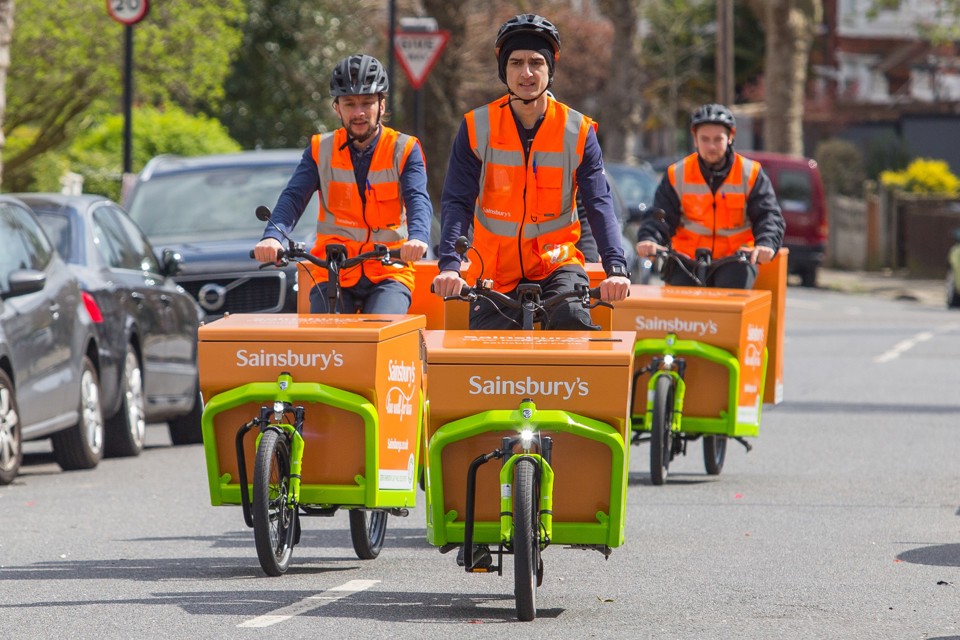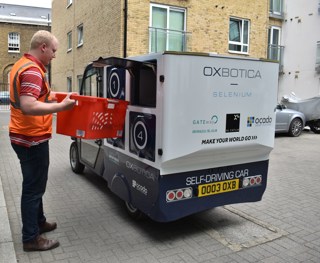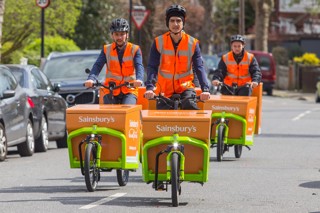Congestion could be reduced and air quality in towns and cities improved if cargo bikes and electric vans were used for last-mile deliveries, according to the Government.
The Department for Transport (DfT) has taken steps towards encouraging sustainable last-mile deliveries through its Road to Zero strategy, which was launched in June.
Now it wants commercial fleet operators the outline what the barriers are to delivering goods more sustainably and what incentives might be needed for firms to replace diesel delivery vans.
Transport minister Jesse Norman said: “Last mile deliveries have been transformed in recent years by the growth of home deliveries driven by the boom in internet shopping. This has led to a marked rise in van traffic.”
According to the latest road traffic estimates, van traffic increased by 4.7% to 49.5 billion vehicle miles in 2016. It is an unwelcome upward trend when towns and cities across the UK are charged with improving air quality and tackling congestion.
Birmingham, Derby, Leeds, Southampton and Nottingham are required to introduce clean air zones by the end of 2019, with several other local authorities expected to follow suit.
London will introduce an ultra-low emission zone from April next year, while Oxford is considering introducing a zero -mission zone in 2020, banning diesel and petrol vehicles altogether starting with six roads in the city centre.
LEZ by year-end
Elsewhere in the UK, Wales and Scotland are heading in a similar direction, with Glasgow set to bring in a low emission zone by the end of this year.
Norman argues that new transport modes could provide the answer for delivery firms, with new electrical methods of delivery, including cargo bikes and electric vans, playing a key role in the last-mile delivery of goods.
He said: “We are on the cusp of an exciting and profound change in how people, goods and services move around the country which is set to be driven by extraordinary innovation. This could bring significant benefits to people right across the country and presents enormous economic opportunities for the UK, with autonomous vehicles sales set to be worth up to £52 billion by 2035.”
The call for evidence, says the Government, fires the starting gun on the Future of Mobility Grand Challenge, which aims to make the UK the world leader in the movement of goods, services and people.
It is one of four ‘grand challenges’ revealed in the Government’s industrial strategy – Building a Britain Fit for the Future – published last November.
It aims to help reduce greenhouse gas emissions, make travel safer and improve accessibility.
The Government has supported the use of e-cargo bikes through the 2015 Shared Electrically Assisted Pedal Cycle (EAPC) Programme and the 2017 Innovation Challenge Fund.
In May, e-Cargobikes.com, with backing from the Innovation Challenge Fund, worked in tandem with the supermarket chain Sainsbury’s to trial the use of electric cargo bikes to deliver groceries.
A fleet of five cargo bikes, each with a capacity of up to 480 litres and a payload of 125kg, were located in London, delivering up to 100 orders a day to local customers who shopped via the retailer’s groceries online website.
The findings from the trials exceeded expectations, with 96.7% of orders fulfilled in a single e-cargo bike drop. It also demonstrated shorter delivery routes and journey times, due to the ability of cargo bikes to make use of cycle and bus lanes and road speeds greater than delivery vans.
Furthermore, it provided evidence of shorter ‘doorstep’ times, due to their ability to park at or closer to delivery locations.
Courier CitySprint recently doubled the number of cargo bikes on its London fleet to 22, while UPS has been trialling trailers towed by cyclists for deliveries in London. The parcels are delivered from a UPS depot to a local hub and loaded on to the trailers for their final journey.
One study has suggested that e-cargo bikes could form 25% of city centre commercial traffic, while another suggested that 51% of all motorised trips in European cities that involve transport of goods could be moved to bikes or cargo bikes.
However, while they are particularly good in high-density urban areas as well as narrow streets in historical city centres, the Government accepts bikes might not be the appropriate delivery mode for every location.
Option of electric vans
Electric vans are another option favoured by the Government and potentially offer a huge opportunity to reduce emissions from last-mile deliveries.
Operators have access to an Office of Low Emission Vehicle (OLEV) grant which will pay for 20% of the purchase price for an eligible van, up to a maximum of £8,000.
However, take-up of these vehicles has been relatively slow, with the market for electric vans well behind that for cars. In 2017, 0.3% of new van sales were electric compared to 1.8% of new car sales.
In part, this may reflect a lack of available products. There are currently just nine vans available for the plug-in van grant, as opposed to 38 eligible vehicles for the plug-in car grant. There are also very few plug-in hybrid vans on the market.
However, product availability is not the only thing that is holding back businesses from adopting electric vans. There is a range of other factors, including charging infrastructure and load capacity.
Phil Eaves, director of supply chain at Farmdrop, says load capacity has been his biggest problem. Running 16 Nissan e-NV200s and eight Renault Kangoo Maxi ZEs, the electric vehicles reflect the firm’s sustainable ethos.
However, he said: “It’s now highly likely we’re going to have to take on non-electric vehicles to accommodate an increase in deliveries.
“We’re still fully committed to electric vehicles and when bigger, more suitable vans become available, assuming the financials work, we will adopt them.”
Manufacturers have announced plans to launch new vehicles that offer a longer range and larger payloads. For example, Mercedes-Benz is expected to launch medium and large electric vans in 2019 and Ford has announced plans to launch a plug-in hybrid transit van in 2019.
Nigel Base, commercial vehicle manager at trade body the Society of Motor Manufacturers and Traders (SMMT), believes the industry is at the start of one of the most significant changes in the way people, goods and services are moved around the country.
“While road transport will remain at the core of how this is done, the type of vehicles, the technology in and around them, and the business models all look set to change,” he said.
“Governments, local authorities, vehicle manufacturers and technology providers are all making large investments in a whole range of technological innovations; alternative fuels, autonomy, ride hailing, vehicle sharing and Mobility as a Service are challenging our existing assumptions.
“Much of the focus has been on carbon reduction and air quality, but most of these new mobility technologies will also make our roads safer, increase efficiency and improve service levels for both people and freight.
“This is a challenge for industry and one of the key targets will be to ensure that the benefits offered by new technologies are accessible to all, but these are challenges we’re ready to embrace.”
At the same time as launching the last-mile consultation, the Government launched a wider call for evidence on the future of mobility, which also addresses changing trends in urban transport.
Ian Robertson, BMW UK chief executive, has been appointed as a ‘business champion’ to help advise, shape and develop the Future of Mobility Grand Challenge.
He will be supported by an advisory council made up of Arup global transport leader Isobel Dedring, technology expert and non-executive director at the DfT Tracy Westall and tech entrepreneur Stan Boland.
Robertson said: “A transport revolution in the way people and goods move around will see more changes in the next 10 years than the previous hundred.
“As the Future of Mobility Grand Challenge business champion, I’m looking forward to working with the Government to help the UK build on its existing strengths and capitalise on that opportunity.”
























Tony D'Amelio - 23/08/2018 23:38
I have been stating in excess of the the past twenty years, where park and ride should be used, i.e. London M25, where people drive off the M25 into the park & ride and then use a one person electric car into town (the C5 at the time), therefore there is no need to recharge the battery util it is returned to the park & ride location, no pollution within the city and ample spaces to park in town - there was negative response from the the car manufacturers account managers and there would be little financial benefits to the local Councils